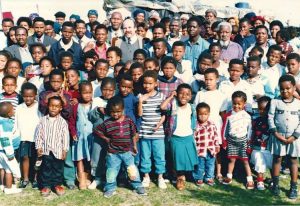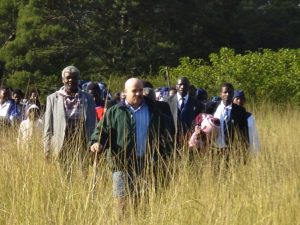
The Koskys moved to the Republic of Transkei with a 40-year commitment to reaching the unreached in this forgotten region of Africa. The primary focus of the mission was to bring Christ to these remote villages, where no churches, Bibles, or Christian witnesses existed.
In establishing Transkei Victory Christian Ministries (TVCM), the Lord has used the Koskys to start hundreds of churches among these remote Xhosa villages. The ministry began to expand beyond the Koskys’ capacity to adequately nurture growth in these new churches. Kelly and Kathy began to release the leadership of many of the young churches to other Christian ministries and ministers. It is estimated that 80% of all the churches that were planted under TVCM have been given the opportunity to operate as independent village churches. But despite the efforts of the Koskys to foster independent local churches, the ministry (TVCM) has continued to grow. TVCM is now the largest existing ministry that is currently reaching this region of Africa.
Tribal Villages of the Transkei
The Transkei is populated by tens of thousands of tribal villages. Each village falls under the authority of the tribal chief, and this ruling chief assigns a local headman to oversee a local village. A village is often referred to as a “location.” As there are very few roads, most of the villages of the Transkei are only accessible by walking long distances.
Many of these villages are populated only by women, children, and the elderly, because the men typically travel across Africa to work in the white-owned South African mines and factories. They normally leave their villages as young men, hoping to earn enough money to someday pay labola (“bride price”) to buy a wife. But once they attain a highly sought-after job, they are very reluctant to leave the industrial areas. Consequently, they only return to their homelands to marry their wife (or wives) and make annual visits to their families.
Typically, the women plow, plant, and harvest the crops. They also build the mud/dung huts. Village life is one of survival: water is usually carried for miles back to the villages, which are vulnerable to harsh weather and wildfires, as well as bands of warriors.

Electricity and medical care are not normally available. The government is beginning to assist with bringing roads and electricity to the villages, but due to the limited government resources, economic and social development is growing too slowly. The government is also working to build schools. But even when these schools are built, it is very difficult to find educated teachers who are willing to live in these rough conditions.
Of the tens of thousands of Xhosa villages, 85% do not have a Christian witness in their location. In the few villages that do have a village church, there may not be Xhosa Bibles available. Often these village churches do not have a resident pastor because there are very few Xhosa trained in the Word of God. It is for this reason that the primary focus of the mission is to not only reach the people of these unreached villages with the Word of God but also nurture them in their newly found faith.
